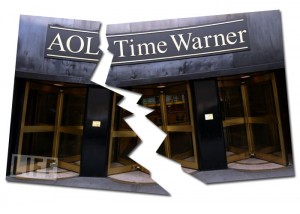CenturyTel to Steal Qwest Communications Inc.
It was announced today that CenturyTel will buy Qwest Communications, subject to shareholder and regulatory approval, for $10.6 billion, or $6.02 per share, in an all stock deal. If you’ll recall, way back in June I recommended Qwest as a company with an ample free cash flow in excess of its reported earnings. At the time, Qwest was at $4.32, and so a $6.02 merger price looks not too bad.
 But you may also recall that I think Qwest is worth upwards of $6.02, merger or not. Their free cash flow last year was $1.564 billion, and the year before that was 1.229 billion. In 2007 their income was distorted by a tax refund from net operating loss carryforwards, but taking that out their free cash flow was $1.454 billion. In 2006, $1.731 billion, and in 2005 , $673 million. So, the five year average was $1.330 billion, which capitalized at 10% would be $13.3 billion, or $7.55 per share.
But you may also recall that I think Qwest is worth upwards of $6.02, merger or not. Their free cash flow last year was $1.564 billion, and the year before that was 1.229 billion. In 2007 their income was distorted by a tax refund from net operating loss carryforwards, but taking that out their free cash flow was $1.454 billion. In 2006, $1.731 billion, and in 2005 , $673 million. So, the five year average was $1.330 billion, which capitalized at 10% would be $13.3 billion, or $7.55 per share.
Of course, it’s not that simple; the land line market is said to be in a decline that has been diagnosed as terminal, forcing these companies to pursue the broadband market. But Qwest seems to have been managing this decline gamely, and the large gap between depreciation and new capital expenditures was spinning off enough money for them to perform an orderly capital restructuring, such as the recent early redemption of $1.2 billion in debt and they do operate largely in rural areas where cell phone coverage isn’t that good anyway. So, even if their free cash flow is not entirely sustainable, they were in a position to whittle away at their debt burden enough to produce a stable long-term company.
Now, let us look at the acquirer, which has free cash flows of $867 million in 2009, $601 million in 2008, $610 million in 2007, $579 in 2006, and $451 million in 2005. Century Tel is an acquisitive company, having acquired Embarq less than a year ago, and the gap between depreciation and capital expenditures is smaller in absolute terms, but on a percentage basis is similar. This undercuts the possibility that Qwest was short-changing its capital expenditures in order to make itself more attractive to acquirers. But it has to be admitted that in terms of free cash flow Century Tel is is a much smaller company, and the same is true of its operating cash flows ($3.3 billion in 2009 for Qwest, 1.6 billion for CenturyTel) and even for the number of employees (30 thousand for Qwest, 20 thousand for CenturyTel).
To be fair, CenturyTel’s balance sheet looks a lot cleaner. On paper Qwest has negative equity (but without $10 billion in goodwill CenturyTel would have negative equity too), and moreover Qwest has covered its interest requirements a little less than twice while CenturyTel has covered it three times, but as I said above, an ongoing capital restructuring at Qwest could address that.
 CenturyTel’s apparent financial strength has given them better multiples–price/free cash flow of 12.25 as opposed to 6 for Qwest even after the merger announcement–or perhaps the average analyst isn’t quite clear on the concept of free cash flow. However, this has resulted in CenturyTel’s market cap being higher, allowing it to eat a company that is larger than itself. Call it the AOL/Time Warner effect. Under the terms of the deal, CenturyTel shareholders would own 50.5% of the combined company, and Qwest shareholders 49.5%, when it is obvious from the above that Qwest is a much larger company and should be entitled to a much larger share.
CenturyTel’s apparent financial strength has given them better multiples–price/free cash flow of 12.25 as opposed to 6 for Qwest even after the merger announcement–or perhaps the average analyst isn’t quite clear on the concept of free cash flow. However, this has resulted in CenturyTel’s market cap being higher, allowing it to eat a company that is larger than itself. Call it the AOL/Time Warner effect. Under the terms of the deal, CenturyTel shareholders would own 50.5% of the combined company, and Qwest shareholders 49.5%, when it is obvious from the above that Qwest is a much larger company and should be entitled to a much larger share.
Accordingly, I call on CenturyTel to bump up the purchase price, and I have rude things to say about Qwest’s board’s acceptance of this offer.
Leave a Reply